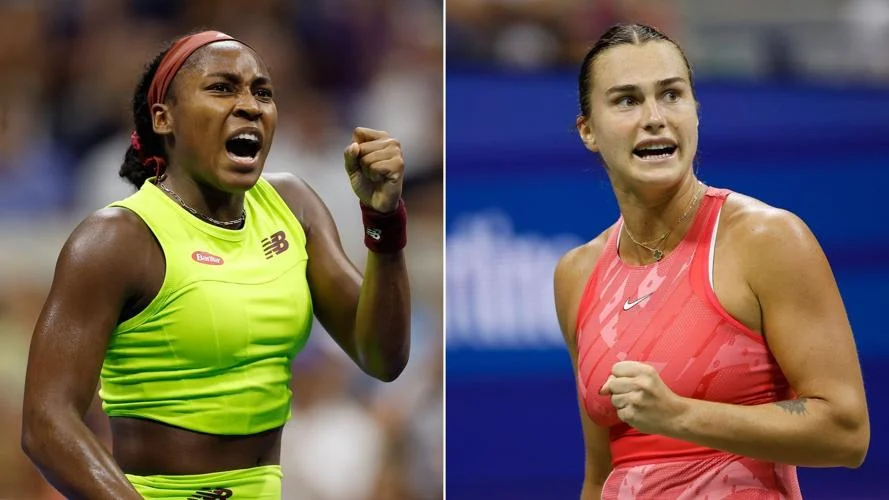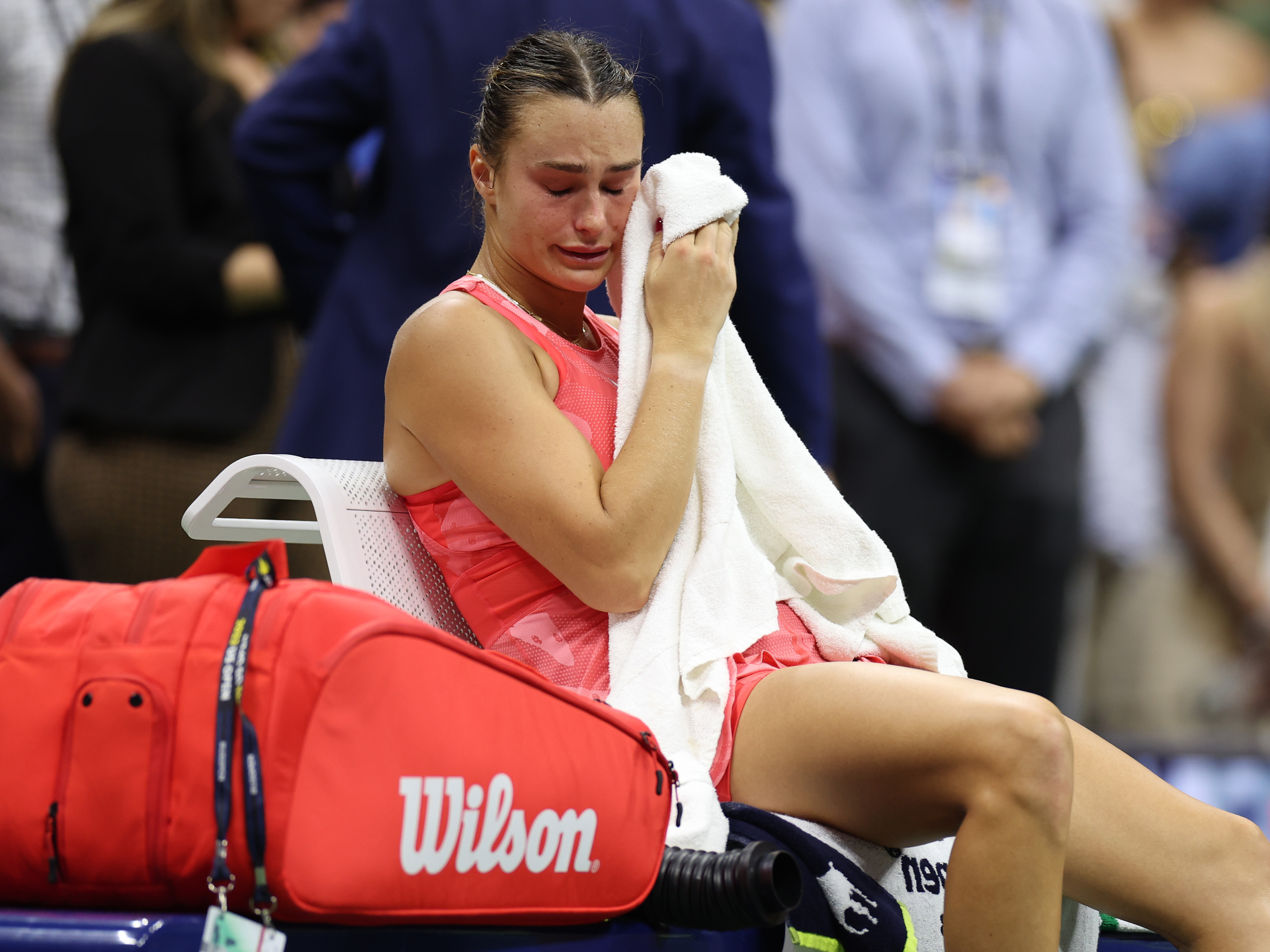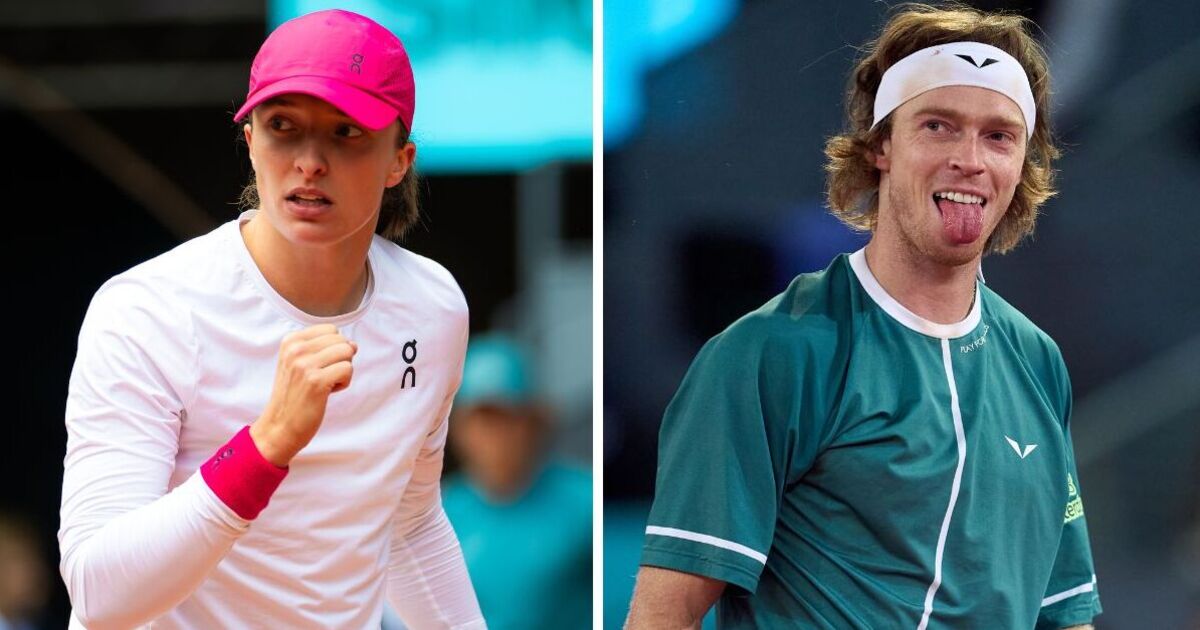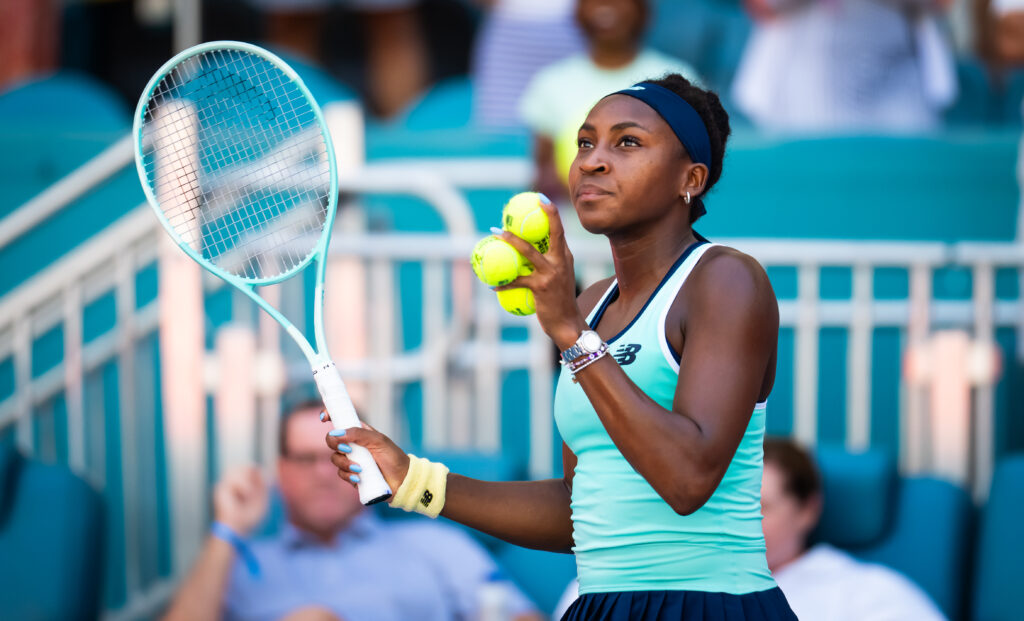💔🎾 Coco Gauff Once Left Aryna Sabalenka in Tears — Before Breaking Her Own Crying Rule 🎾💔
Coco Gauff vs. Aryna Sabalenka isn’t just a tennis matchup. It’s become a modern sports saga, filled with fire, finesse, and feelings. The day Coco Gauff left Aryna Sabalenka in tears—only to later break her own rule about crying—wasn’t just about victory or defeat. It was about vulnerability, womanhood, and what it means to carry the weight of the world in a tennis skirt.
In this post, we dive into that emotional night at the 2023 US Open final, where power met passion, and where one player’s heartbreak gave way to another’s breakthrough.

💥 The Match That Broke More Than Just Serve Speeds
The 2023 US Open final had all the makings of a blockbuster. Aryna Sabalenka, the Belarusian powerhouse known for her ferocity and thunderous baseline strikes, had just secured the No. 1 WTA ranking. She was the favorite. The lioness.
On the other side of the net was Coco Gauff, America’s teen prodigy, then just 19 years old, with the poise of a veteran and the speed of a sprinter. She had carried the pressure of a nation, the expectations of the Serena Williams legacy, and the hopes of Gen Z.
But this night was more than tennis. It was a test of nerves. Of heart. Of soul.
And when Gauff won 2-6, 6-3, 6-2 after dropping the first set, the stadium didn’t just erupt in applause—it inhaled the weight of what had just unfolded.
😢 Aryna’s Honest Tears: “I’m Not a Robot”
After the match, cameras caught Sabalenka sobbing in the locker room. She tried to contain it. She tried to smile for the ceremony. But the tears came anyway—hot, heavy, real.
Later, Sabalenka confessed in interviews, “I’m not a robot. I felt I had it. I felt I could win. And then… I didn’t.”
It was a rare glimpse into a top-tier athlete’s psyche. Aryna Sabalenka, often framed as the fierce competitor with an iron will, reminded the world that strength and softness can—and do—coexist. That loss isn’t just a scoreboard. It’s emotional whiplash. It’s pain.
And the reason behind her tears? It wasn’t just defeat. It was Coco Gauff’s resilience. Her refusal to go away. Her transformation, mid-match, from a pressured teen to a fearless champion.
🙏 Coco’s Silent Rule: “Don’t Cry Until the Locker Room”
Ironically, Coco Gauff had a rule.
“I try not to cry in public,” she once told the press. “I wait until I get to the locker room.”
But after winning the biggest match of her life—after lifting her first Grand Slam trophy in front of a roaring New York crowd—Coco broke her own rule. As she knelt down at courtside, head buried in towel, she let it all out.
Not just tears of joy. Tears of relief. Tears from years of expectation. Of criticism. Of wanting to be perfect and powerful in equal measure.
She later revealed that she thought about the doubters. About the people who said she was “overrated,” that she’d “never win a Slam,” that she was “too nice to be great.”
“Those tears,” she said, “were for everything they said I couldn’t do.”
🧠 The Mental Game: From Pressure to Power
What made this match iconic wasn’t just the tennis. It was the mental war.
Gauff didn’t start strong. She dropped the first set 2-6. But she adapted. She adjusted her game. She trusted her fitness and belief. The crowd rallied behind her, chanting “Let’s go, Coco!”—and it became a turning point.
Sabalenka, meanwhile, began to overhit. Her legendary power became a double-edged sword. And Gauff? She ran. She retrieved. She frustrated.
In the third set, it was Sabalenka who looked overwhelmed—mentally, emotionally, physically.
The moment wasn’t lost on fans. Social media exploded. Tweets poured in from Serena Williams, Michelle Obama, and even President Joe Biden.
This wasn’t just a tennis win. It was a cultural moment.

🎙 The Mic Drop: “I’m Doing This for Me”
In the press conference, Coco Gauff addressed her critics head-on.
“Thank you to the people who didn’t believe in me,” she said, smiling. “Because you gave me the fuel to win.”
It wasn’t arrogance. It was clarity. She wasn’t playing to prove people wrong. She was playing for herself. For the little girl who picked up a racket at age 6. For every young Black girl who dreams of doing something different.
“I used to think crying was weakness,” she added. “Now I see it’s strength.”
🌎 Social Ripple: A Win Beyond Tennis
The aftermath of the match lit up every corner of the internet.
- #CocoGauff trended worldwide.
- Videos of her hugging her father, crying in his arms, went viral.
- Brands from Nike to Head dropped congratulatory ads within hours.
- Young girls posted TikToks reenacting her celebration.
- Aryna Sabalenka trended too—because fans praised her honesty, her emotion, her willingness to show the world her pain.
The message was clear: It’s okay to cry—win or lose.
It’s okay to feel. It’s okay to be more than a result.
🖤 Rivalry Built on Respect
What makes the Coco Gauff vs. Aryna Sabalenka dynamic so compelling is that it’s not toxic. It’s not filled with drama or shade. It’s built on respect.
After the match, Sabalenka hugged Gauff. She didn’t have to. She could have stormed off. But she stayed. She smiled through the pain. And she later said, “If anyone was going to beat me tonight, I’m glad it was her.”
And Gauff? She returned the love.
“She’s an amazing player,” Coco said. “And trust me, she’ll be back. Stronger.”
🌱 Breaking the Crying Rule: Why It Mattered
For years, young athletes—especially women—have been told to toughen up. “Don’t cry.” “Don’t show weakness.” “Be a warrior.”
But Coco Gauff and Aryna Sabalenka turned that idea on its head.
They showed us that tears aren’t weakness—they’re honesty. They’re what happen when you care too much, when you give everything.
And for Gauff to cry in front of the world, breaking her own rule, was not a breakdown—it was a breakthrough.
🔮 What’s Next?
Since that US Open final, Coco Gauff has continued to rise. She’s ranked inside the top 3. Her confidence has grown. Her game has matured. And the scary part? She’s only 20.
Sabalenka, too, hasn’t stopped fighting. She rebounded by winning more titles, continuing to grow as a public figure and athlete who doesn’t hide her scars.
Fans are waiting for the next chapter. The next showdown. The next moment where greatness collides with greatness.

💬 Final Thought: We Needed That Moment
In a sports world often obsessed with numbers, stats, and cold domination, we needed that US Open final.
We needed Coco Gauff’s joy.
We needed Aryna Sabalenka’s pain.
We needed both tears—because they were both real.
Coco Gauff Sabalenka tears isn’t just a search keyphrase. It’s a symbol. Of growth. Of grace. Of guts.
And if you’re reading this, just remember: whether you’re on center court or facing life’s biggest serve, it’s okay to cry. Just make sure you keep swinging.


